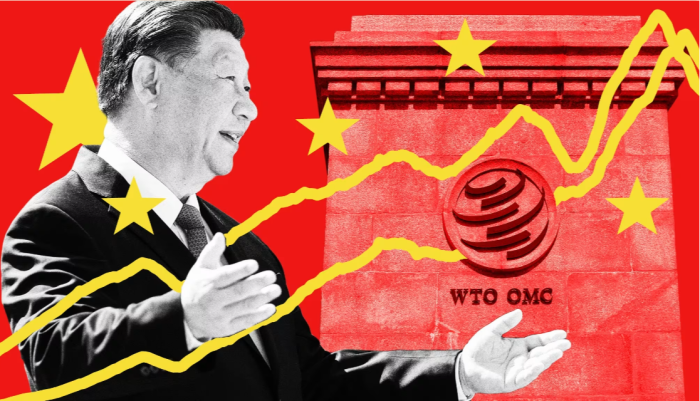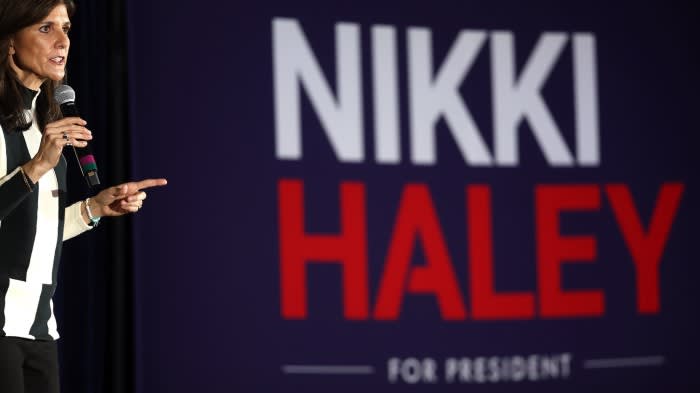Stay informed with free updates
Simply sign up for the World myFT Digest – delivered straight to your inbox.
Good morning, and we begin today with the fallout from the South Carolina primary election on Saturday.
Americans for Prosperity, a political spending group backed by influential conservative billionaire Charles Koch, said it will stop funding Nikki Haley's presidential campaign following her heavy defeat to Donald Trump over the weekend in her home state.
The move is a sign that Haley's support among top Wall Street Republicans and corporate donors — which helped sustain her bid for the White House — is beginning to wane as Trump's victory in the GOP nominating contest emerges.
Haley pledged to press ahead with her bid to reach the White House until at least Super Tuesday, a week from tomorrow, after her defeat by the former president, who received 59.8 percent of the vote, compared to 39.5 percent.
But despite Trump's landslide victory, AFP Action stopped short of endorsing his presidential candidacy, suggesting that the group may remain on the sidelines of the presidential race and instead focus on congressional contests.
Emily Seidel, a senior adviser to AFP Action, said Sunday that she expects Trump to lose the general election in November.
“If Donald Trump is at the top of the Republican ticket, the risk of one-party rule by a Democratic Party captured by the progressive left will be severe and do irreparable damage to the country,” Seidel wrote. For a more in-depth look at where donors are putting their money in the 2024 presidential race, sign up for our US Election Countdown newsletter.
OPINION: The former South Carolina governor is strengthening her brand by standing alone against Donald Trump in the GOP, says Edward Luce.
Here are the other things I'm monitoring today:
Sweden's request to NATO: The Hungarian National Assembly is expected to ratify Sweden's membership in the Western military alliance.
World Trade: Ngozi Okonjo-Iweala, Director-General of the World Trade Organization, will hold a press conference on the occasion of the opening of the Thirteenth Ministerial Conference of the World Trade Organization in Abu Dhabi, which continues until Thursday.
Monetary Policy: The Central Bank of Israel announces its latest decision on interest rates.
Industry Events: The leading mobile phone industry conference, MWC Barcelona, starts today, as does the Geneva International Motor Show.
Companies: Wireless tower operator SBA Communications, pipeline operator Oneok, and Zoom report earnings.
US Supreme Court: The court is hearing arguments about the legality of Republican-backed state laws in Texas and Florida that restrict the ability of social media companies to curb content on their platforms that these companies consider objectionable.
Five more stories above
1. Israel plans to raise about $60 billion in debt this year, freeze government hiring and raise taxes, as it nearly doubles its defense spending to support its war in Gaza, according to a senior finance official. The conflict with Hamas has taken a heavy toll on the country's economy, but the Finance Ministry expects the economy to begin to recover with the demobilization of large numbers of reservists and a recovery in consumer spending. Read more about the state's financial plans.
Ceasefire talks: The US hopes to reach a Gaza ceasefire and hostage agreement in the “coming days” after progress in negotiations in Paris over the weekend.
Palestinian Authority: Palestinian Prime Minister Muhammad Shtayyeh submitted his resignation, in a move that may pave the way for the formation of a new technocratic government responsible for the reconstruction of Gaza.
2. China's Ant Group has bid against Citadel Securities, the Miami-headquartered market maker founded by billionaire Ken Griffin, to buy Credit Suisse's Chinese securities unit. A sale to the company founded by Jack Ma could complicate UBS's plans to divest the unit because it requires regulatory approval, and Ant has been in the crosshairs of regulators in recent years. Here's more on the competing bids.
3. Ryanair is demanding compensation from Boeing for worsening aircraft delivery delays that have forced the airline to lower its forecast for passenger numbers and warn that it is about to cancel some flights this summer. Michael O'Leary, Ryanair's chief executive, said he was “really unsure” how many 737 MAX planes the US carrier would deliver in time for the peak summer months. Read more of O'Leary's comments.
4. President Volodymyr Zelensky tells US that Ukraine needs $60 billion in aid is currently stuck in an impasse in Congress within a month. Zelensky said the long-awaited package is about military support, not financial, and he is not sure Ukraine will be able to find the types and quantities of weapons it needs if funding is not available.
5. Warren Buffett warned Berkshire Hathaway shareholders at the weekend that his sprawling $905 billion conglomerate had “no potential for eye-catching performance” in the coming years. In his annual letter on Saturday, Buffett said there were very few deals that provided the kind of transformative impact that previous acquisitions had. Read more about the message from the so-called Oracle of Omaha.
Great reading

The World Trade Organization – which holds its biennial ministerial conference this week – has become hostage to sharp divisions between the United States and China as trade friction between China and the West escalates. With the World Trade Organization faltering, Beijing is accelerating efforts to build an alternative trade architecture insulated from Washington's influence and centered on the developing world.
We read too. . .
Media: Layoffs dominate the sector but new ideas keep emerging, writes Eileen Moore.
Sovereign debt: Can bond custodians now turn their disruptive talents to the US Treasury market, asks John Blinder.
Inflated job titles: Some headhunting firms say job title inflation has grown so much since the pandemic that it has outpaced the actual inflation that has rippled across the globe, writes Belita Clark.
Today's chart
The widespread decline in global house prices that hit advanced economies has largely faded, according to a Financial Times analysis of OECD data. Across the 37 OECD industrialized nations, nominal house prices rose 2.1 per cent in the third quarter of 2023 compared with the previous three months, up from near-recession at the start of last year. Read more about the findings of the FT analysis.
Take a break from the news
. . . And read our post from Milan Fashion Week Fall/Winter 2024, where designers at Bottega Veneta, Ferragamo and Bally face the challenge of pleasing conservative clients — and sometimes owners — while generating enough of a creative spark.

Additional contributions from Irwin Cruz and Benjamin Wilhelm
Newsletters recommended for you
Work – Everything you need to get ahead at work, in your inbox every Wednesday. Register here
You should read it – the only newspaper article you should read today. Register here

